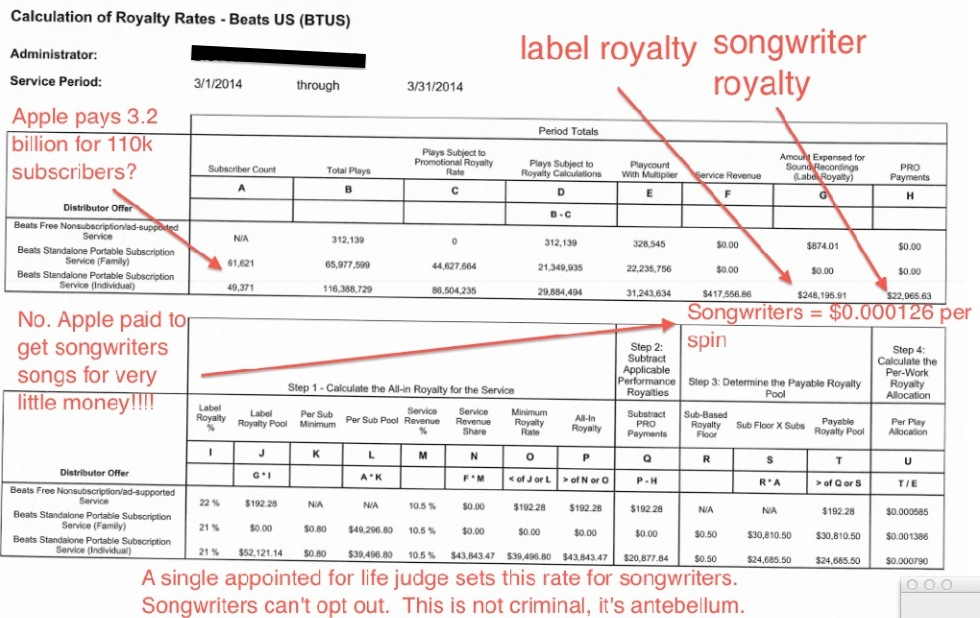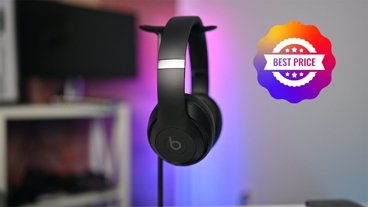Just 0.17 percent of the 183 million tracks spun on Beats Music in March were attributed to non-paying customers, purportedly leaked data indicates, suggesting that the service is converting trial users to paid subscribers at an impressive clip.
The figures were revealed in a March 2014 royalty calculation document discovered by music industry website The Trichordist and first noticed by Business Insider. According to the document, "Nonsubscription/ad-supported" plays totaled 312,139 in the period compared to 182,366,328 for the "Standalone Portable Subscription Service."
The seemingly high ratio matches up with a report from earlier this week in which it was said that Apple's eye was drawn to the headphone maker in large part due to the rate at which Beats Music was converting trial users. New users are given a seven-day free trial of the service, after which a $9.99-per-month subscription is required.
The document also gave a glimpse into Beats Music's overall subscriber numbers, showing that 56 percent — or 61,521 of the 110,992 paying customers — were on the family plan offered in partnership with wireless carrier AT&T. Because each family plan can support up to five individual listeners, that could represent as many as 308,105 people.
Additionally, despite representing a smaller share of accounts, individual subscribers played nearly twice as many songs as their counterparts. The Trichordist also noted that Beats Music appears to have negotiated a low royalty rate for songwriters, but those rights are not generally transferable in the event of an acquisition and will likely need to be renegotiated.
Overall, the numbers paint a somewhat rosy picture for the future of the fledgling service, which many believe is the catalyst behind Apple's alleged $3.2 billion bid for Beats Electronics. Beats Music's design and functionality — including the "sentence" recommendation algorithm and curated playlists — have won rave reviews from customers and could themselves form the basis of a similar Apple-branded service.
 AppleInsider Staff
AppleInsider Staff








 Christine McKee
Christine McKee
 Marko Zivkovic
Marko Zivkovic
 Mike Wuerthele
Mike Wuerthele

 Amber Neely
Amber Neely
 Sponsored Content
Sponsored Content
 Wesley Hilliard
Wesley Hilliard










141 Comments
This rumour is looking better and better everyday.
This rumour is looking better and better everyday.
I have to admit this as well. I was not happy at first after seeing Dr. Dre's profanity and n-word laced youtube video. I do not want Apple associating with that type of culture. I feel the same way if it was Eminem so it isn't a Black/White thing. I am getting more intrigued as I read about this acquisition and the reasons for it.
Without knowing the details, which are now coming to light, no one could say if this was a good deal or not. Cook and company aren't stupid or frivolous, so I'm sure they have made an informed decision before spending this kind of dough.
[quote name="SolipsismX" url="/t/179522/beats-music-had-110k-subscribers-in-march-with-impressive-free-to-paid-conversion#post_2532975"]This rumour is looking better and better everyday.[/quote] You mean it's being spun by certain Apple sites to look better and better every day. ;)
[quote name="lannoc" url="/t/179522/beats-music-had-110k-subscribers-in-march-with-impressive-free-to-paid-conversion#post_2532982"]Without knowing the details, which are now coming to light, no one could say if this was a good deal or not. Cook and company aren't stupid or frivolous, so I'm sure they have made an informed decision before spending this kind of dough.[/quote] There are no details coming to light. All of it is rumors at this point.